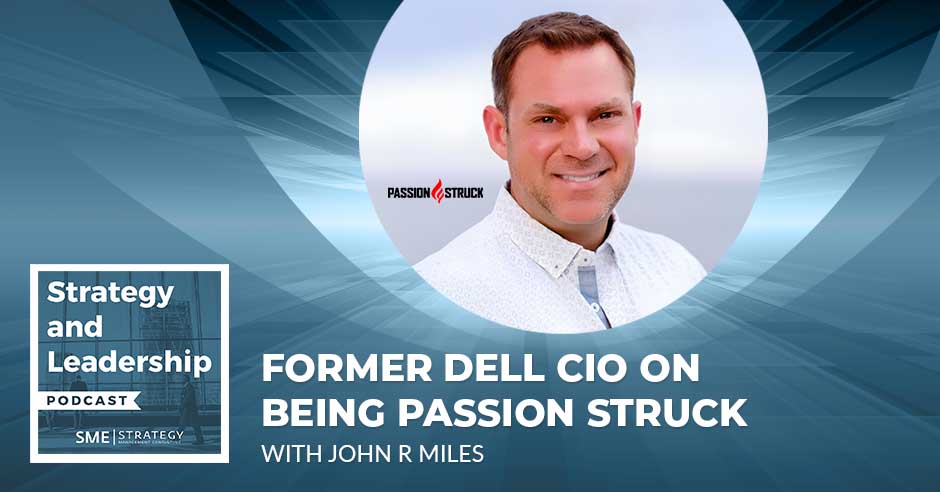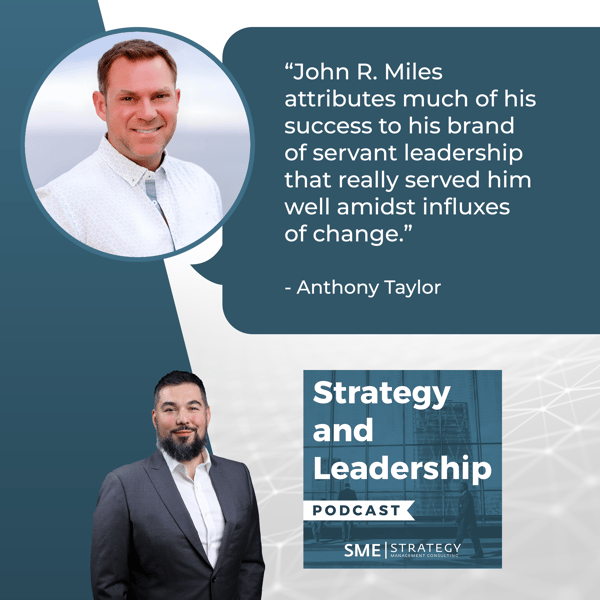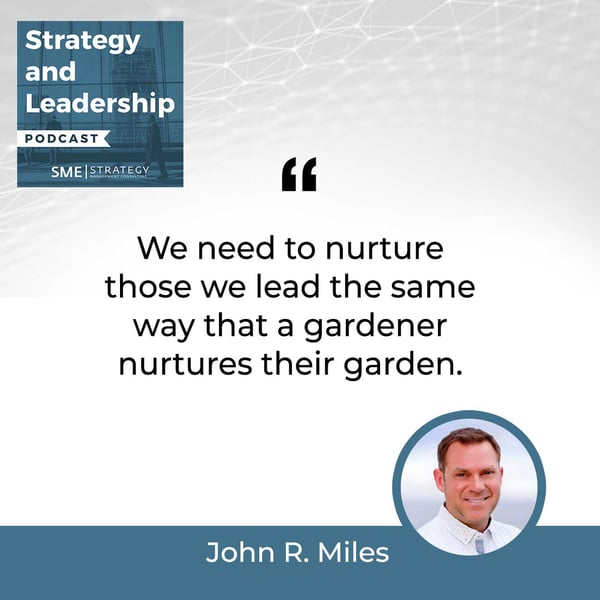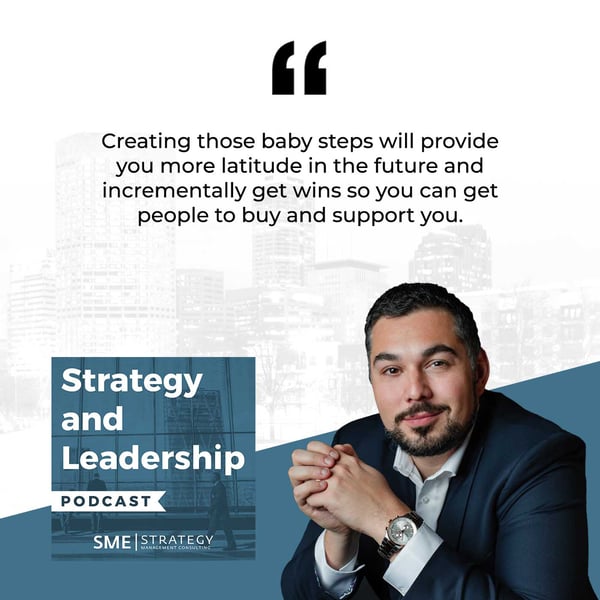
Would you embrace the flames that would ignite within you or let the cold wind snuff it out? How would you be proud of yourself if you wouldn’t let those flames burn bright? In this episode, John R. Miles, the former Dell CIO, delves into what it means to be Passion Struck in leading into your organization. He explains the meaning of the Gardener Leadership Style and the importance of being a Servant Leader. This episode shows how bright John’s torch burns as he leaves embers of insights on the value of leading with your feet and nurturing everyone with your leadership. Embrace your flames and let that radiate in leading those around you. Let’s join John Miles today and be Passion Struck with him.
Listen on Spotify: https://open.spotify.com/episode/7HKHxlFyGQbyhKGocbqrP8?si=KPuPFxn8SHOG-nmv5a4Rnw
Listen on Apple Podcasts: https://podcasts.apple.com/ca/podcast/former-dell-cio-on-being-passion-struck-with-john-r-miles/id1202449526?i=1000645437165
Want to continue the conversation with other leaders around the world? Join our Strategy and Leadership community.
https://strategy-and-leadership.mn.co/
► Subscribe to our channel for weekly videos on strategy & leadership: https://www.youtube.com/channel/UCOHLNRrpk3rGUdg7qUQjiog/?sub_confirmation=1
➡️ Looking for a sample agenda for your strategic planning offsite? https://www.smestrategy.net/blog/sample-strategic-planning-agenda
Connect with us:
► Contact us: https://www.smestrategy.net/contact
► Connect with Anthony on LinkedIn: https://www.linkedin.com/in/anthonyctaylor604/
About SME STRATEGY CONSULTING:
SME Strategy is a management consulting firm that specializes in helping organizations develop and implement their strategic plans. We work with teams to facilitate conversations about strategic direction and business strategy so that our clients can focus their energy on what will move them forward faster.
► Work with us: Are you looking for someone to facilitate your strategic planning process? https://www.smestrategy.net/strategic-planning-facilitator
► Check out our Strategy & Leadership Podcast: https://open.spotify.com/show/4yND4JKofh64gcvyvcLMqW
► Check out our online course on how to successfully lead your next strategic planning process: https://courses.smestrategy.net/
---
Watch the episode here
Listen to the podcast here
Former Dell CIO On Being Passion Struck With John R. Miles
My guest in this episode is John Miles, who is the founder and CEO at Passion Struck. John, how's it going?
Anthony, I'm doing fantastic. Thank you so much for having me. I'm so excited to be here and serve your audience.
It's my pleasure. Thank you for chatting with us. As we chatted before we started, I thought you'd be a great guest because you have such a varied scope of experience from consulting to being a CEO to working inside a very large well-known organization, which I will let you introduce. It's cool to hear both your trajectory over the past many years and then what's led you into what you're doing now. Maybe you can tell our listeners a little bit more about you and how you got to where you are.
Ever since I can remember, leadership has been something that has fascinated me. Even as a kid, I looked for leadership opportunities whenever I could, whether that was on a sports team, taking a new job, or whatever. As I was in high school and planning for what I saw my life was going to become, I started looking at where I wanted to go to college and the Naval Academy came up and I thought, “What better opportunity to go to a place that builds leaders than to go to one of the service academies?”
I ended up going to the Naval Academy. I served as an officer for a number of years in the Navy where I learned more about how to become a servant leader and then ended up getting out not to pursue a civilian career, but to become an FBI agent. As fate would have it, which I think is an important lesson, sometimes life throws us curve balls and that's what would happen to me. That was about two days from going to my Quantico class and Congress was in one of these budget fiascos like we're experiencing right now. They had to recycle my class.

Need a strategic planning facilitator to help align your team and reach your goals faster? Learn more about how SME Strategy can help: Strategic planning facilitator.
It ended up being about three years later that I would've had the opportunity to go and at that point, I ended up getting into Big Four consulting, which I ended up doing for the next 6 to 7 years of my life. I then pivoted because another life event happened. I was at Arthur Anderson when Enron trans-folded and transpired. I had to move into industry and then spent the next twelve years of my life and Fortune 100 companies eventually becoming a C-level at Dell Computers and then transitioning into private equity. I did that for a number of years, both as a partner in a private equity firm and as a CEO in several portfolio companies. About a few years ago, I launched Passion Struck.
As a layperson, I've got my own chops that I've done, but that's awesome. That's so cool. I got to the peak of like pretty much everything that you are working within and then being the CIO of Dell was no small feat too. I can't help but wonder, but all of the compounding learning that you had, what you learned from the Navy, and how it supported you in consulting. What you learned in consulting and how it supported you in those data and technology roles. That's the impetus of the podcast and then leading all of that into your book and into your work. What are some of the top three biggest takeaways from your awesome career that guide how you view leadership now and how you view running a successful business that you could share with our leaders?
Let me tell you one thing right off the bat. I'd be much better now than I was earlier in my career because I think it's great being a consultant because you get to go see different environments, you get to lay out game plans, but the big drawback is you don't get to implement any of them. To me, that's where the rubber meets the road and you become accountable as a leader. Seeing what worked and what didn't work now would be a great thing to have from a perspective-shifting aspect of being able to go back and do it again. I do it to some components with what I'm doing now, but it has made me a much better one.
As far as leadership, one of the things that I was brought up in was being a servant leader. I think that it served me extremely well during various portions of my career but I think the world that we're in now requires a different type of leadership. A leadership that is able to achieve with the influxes of change that's going to happen and a leadership style that deals with how employees want to work in this remote arena of work-life balance that we find ourselves in.
I am now advocating for what I call the gardener leadership style, which is we need to nurture those who are leading in the same way that a gardener nurtures their garden. To sum this up in four words is eyes on, hands off. A great way to think about this is to think about a military leader, it could be a four-star at central command who is dispatching a SEAL team in the Gulf right now. They have to be eyes on from the standpoint that they're cultivating a group to execute this task where they know they've been prepared properly. They know that they've been educated on what the mission objectives are. They know that they've been educated on having the right physical training as well to get them through it.

However, they also have to be hands-off in understanding that when they send them on this mission, they don't have the perspective of being there in the operating environment that they find themselves in. They need to be hands-off to let them make the decisions that they need to make to make that into a successful mission.
I think it's the same way that we need to be leading the people who follow us now in this world to give them an over sense of direction and how to perform their jobs but not be micromanaging in the way that they're doing it. Also, this incorporates being ambitious in how you are leading people, which is one of the biggest learnings I made over my career is that so often ego gets the best of us, and being an ambitious leader is going to get you so much farther.
Ambitious, if I heard it correctly, is humble and ambitious. I imagine the two. Let me ask you. I want to ask you about two of those other lessons that you learned. You've been in the industry for years. You've gone from military consulting, corporate, Fortune 100 30-year career. You've seen management change and evolve from the early days of management by objective. Different people have their leadership styles and what you're saying is being more like gardening, supporting, and responding to the needs.
What do you tell leaders who might be stuck in old ways of managing? Maybe they are in that command and control way that they don't value transparency or they aren't necessarily transparent. It's like, “My way or the highway,” because I do believe that there are a lot of organizations that are still like that. How do you move somebody from that authoritarian leader to somebody who can adapt their leadership style to support more of a gardening philosophy?
The way I like to try to do it is I like to institute a 360-degree review if we can so that leaders can see how they're being viewed by peer subordinates, their superiors, etc. It’s because I think when someone is in this situation, oftentimes I find people who are leading this way don't have the best self-examination practices and how they themselves are seeing themselves act. To me, when you're acting in this way, you're running into doing things such as showing gratification, even if you do, but in an inauthentic way.
You're pushing people so much to be how you want them to be, that you're not leveraging the inherent talents that the employees who are working for you have. I try to get them to step back and to start seeing things through a different perspective that the way that they're leading doesn't have to be either/or it can be both. Also, taking both approaches is going to get them much further and have the employees perform at the levels that they aspire to achieve.
I want to say it's simple but super smart because it's like, “You don't need to give up what's comfortable for you, but take the opportunity to learn and reflect on what your people want.” If you truly are a servant leader, you're going to be interested in what people want because they're the reason you're there. If they don't want it, then they're not going to do the work. I like the idea of being able to not only have one singular style but also look at the different opportunities and benefits of each. Going back to my original question, what are 1 or 2 more lessons that you learned through your experience that take you into now? If it’s practical, the better.
I'll give you a couple of great ones. One is that being right sometimes means being alone. For me, I found this lesson in one of the most profound ways. When I was at Dell, I was asked to lead this initiative, which at the time was the largest initiative we were running. We were spending between $100 and $150 million a year on it. As I was examining the capabilities that we were putting into the business and where the board and Michael wanted to drive the company after we spent seven years completing this, we were going to have a huge gap. It’s because the technology we were using didn't facilitate where the business was going to be.
Being right sometimes means being alone.
I remember Michael didn't sit on the executive steering committee for technology. It was made up of the CFO and several of the divisional presidents and I had found an alternate solution that we could implement at a fraction of the cost. We could do it much more quickly, but it would cause several of these executives to get pie on their faces because one of the presidents who held my job previously recommended this.
I remember having a coffee with Michael a couple of hours before this meeting and he said, “Sometimes being right means being alone.” Oftentimes, even though it's not the popular decision and it's not what they want to hear, you've got to give what you feel is the best decision. What aligns with your core values and what you have come to realize is the best thing for the company in this particular situation? Now, the ramifications may not be what you want them to be. In this case, they were very upset at me for recommending this, but eighteen months later it all came back when the CFO wrote to me and said, “You were absolutely correct in your recommendation and the other solution was never going to work.” That's one.
Another one is, “People speak with their feet.” This is something that I learned from a prior CIO boss of mine, Jay Skibinski. I remember we were working on this major initiative to overhaul the technology of this company called Lend Lease. We were in this meeting and you had a whole bunch of the senior leaders shaking their heads saying, “We're all in on this.”
I remember him talking to me a couple of hours afterward and he goes, “Just watch because people speak with their feet.” As he predicted, people would nod in that meeting and then come out and start acting completely differently. I think that one of the biggest issues you have in inauthentic leadership is when you don't lead with your feet, when you don't lead with your actions, people see that so much more clearly than they do whatever words you want to give them. Those are two of the key learnings out of hundreds that I've had over my career.
When you don't lead with your feet or your actions, people will see that more clearly than the words you want to give them.
I’m picturing you in that room about to give your brief. Let's talk about digital transformation a little bit because you know that's your experience. In 2024, there's AI. Technology is moving super fast. There are CIOs or VPs of technology that are in a position where they have to recommend a course of action to not only the CEO but often, in small businesses, not necessarily a board and it's required change.
I think the juxtaposition, or at least the even side by side is you might be alone in some things, but you absolutely also need to get everybody's buy-in into an initiative, otherwise the whole thing will fail. What would you recommend to somebody, whether it's technology or not, that might be recommending an unpopular opportunity, but also has to make sure that they get the team's buy-in into it? What have you done? What have you seen, what would you recommend?
I'll give you a great example. That principle of sometimes being right means being alone, one of the people who I have seen implement that the most was at the helm of Apple for decades yet Steve Jobs knew not only the times that he needed to be right but also how to garner support behind the ideas when he was right. Once you understand with conviction that something is going on the right path, it's having all of you passionately supporting it and going out to the others in the organization and being a prophet as to why this is the correct approach.
A great example of this would be Marc Benioff, when he started Salesforce cloud computing wasn't even a thing. In fact, he was asinine for doing it. I remember when he started this journey and every one of us was running on-premise technology. He would go in the rooms where CIOs and CEOs would laugh at him about creating this universe where people would be operating everything off of the cloud and they couldn't even see it as a possibility.
I think if you're doing this, what you need to do is, oftentimes I have found that people can't see the long-term vision that you have. You need to break this down into steps that are shorter term that people can get behind that start taking them in the direction that's more towards the vision you want to achieve and incrementally, you can then expand what that zone of that aspiration is slowly over time to get more people bought in. The other thing it does is as you've made progress, you can then use that momentum to carry you forward as it grows. You can also use this as a way to measure the progress from where you've been to where you are in the future. I think Steve Jobs did an excellent job of that when he was at Apple.
As you're driving a big change in baby steps approach and trying to garner that success. I have to say something, John. This is speaking to your credit to the readers. We read books about Steve Jobs and you read podcasts, you see all these famous people, but the line of difference between me and Steve Jobs, it's way different than John and Steve Jobs or John in these organizations because years ago, they're your competitors. They're the people in the ecosystem, they're the other Fortune 100. In my belief, or at least what I hear, is that your lens on them is much closer. I was trying to find the famous Philadelphia Eagles in my brain, but it's like, “You're another professional team competing against all of those people.”
In the time when you were at Dell, I don't want to say peak computing or peak technology, but that's where those innovations were. The small innovations were creating significant advantages. I could only imagine what it was like having those conversations like developing those new revolutionary technologies at once and then trying to get people on board with whether it's cloud computing, personal computing, VoIP, data integrity, or whatever. I imagine that it was a fun time and then through your private equity life, also transforming those organizations into the new digital realm. Am I on base with what I'm saying?
You're definitely on base. The time that I was at Dell in the late 2000s was exactly when Steve Jobs launched the iPhone. We were working on a competitive solution to that. It was led by Ron Garriques, who was very famous for coming out of Motorola and creating the Razor phone, which was at that point, the most recognized phone in the world. I remember we were working on two solutions at the time. One was going to be Android-based and the other was a Windows.
The Android was where we had put all the effort into this new device called a Streak, which is now about the size of your typical phone but at the time the critics were saying it was too big. The interesting thing about watching this was we were all aligned to go Android and then we all had a meeting with Steve Ballmer, who was the head of Microsoft at the time. We came out of that meeting telling him that we were going to move forward with Android because Windows didn't have as big a presence.
I remember about three hours later, Ron called us into his office and said, “Michael struck a deal with Ballmer and we're dead on arrival because we're coming out on the Windows platform first and he was correct. Seeing all of that, I had the chance to meet Steve Jobs a couple of times. I went on probably 40 city visits with Marc Benioff so yes, I know all these people I'm talking about.
There are thousands of hours of stuff I'm sure you could share, but even in that, being in your position leading technology and leading a team, one of my big takeaways from this is that gardener mentality. Helping and fostering people. I like the idea or the military concept is you need to prepare these people but don't touch them because when it's happening, you can't micromanage them. Also, leading technological innovation or anything that you're trying to do, whether it's technology or otherwise.
It could be HR or finance or whatever it's creating those baby steps will provide you more latitude in the future and incrementally get wins so that you can get people to buy in to support you and then it'll build a better platform in the future. John, I'm sure we can talk for a very long time but as we finish up, how can people get ahold of you and how can they learn more about the work you're doing with Passion Struck?

Anthony, several of the principles that we talked about here, such as the one that I talked about being someone who sometimes is right sometimes being alone, which I call the boundary magnifier. They are all components of my brand new book that's coming out, Passion Struck: Twelve Powerful Principles to Unlock Your Purpose and Ignite Your Most Intentional Life. These are twelve principles that I created observing 700 of the most dynamic leaders over the past many years. I found this recurring pattern of principles that they all used to propel their lives forward. People like Marc Benioff, Steve Jobs, Oprah Winfrey, Jeff Bezos, astronauts, and whoever they may be.
That book is now available for pre-order and will come out on February 6th, 2024. In addition to that, I host the Passion Struck Podcast. If you're looking for something that it's in the health category, but all our episodes are how do you create this fulfilling life through the way that you're approaching your health, wellness, overall behaviors, and the choices that you're making on a daily basis? You can go to PassionStruck.com, which is our website where you can find me on all the social platforms @JohnRMiles.
John, thanks for sharing with us. I think it's so cool what you're doing and I love that you're pouring back into people evolving what you're doing now. One of the tenets of the show itself is none of us is as smart as all of us. To hear how you've taken that all in and to share it with people is pretty awesome. John, thanks for the time. It's been such a pleasure and wishing you nothing but the best moving forward.
Thank you, Anthony, for having me.
Thank you so much for joining us on this episode. My guest, John R. Miles, checked him out online. Check out his podcast and the book. One of the things I'm taking away from now is, you know, there's always a different way to be a leader. There are great ways to evolve as a leader and versus an “or” style of leadership, there's always an “and” style of leadership. How can you incorporate other components into your leadership to support you in helping the people around you? Thanks for reading this episode. See you next time.
Important Links
- Passions Struck
- Passion Struck: Twelve Powerful Principles to Unlock Your Purpose and Ignite Your Most Intentional Life
- Passion Struck Podcast
- @JohnRMiles - X
- https://www.LinkedIn.com/in/milesjohn/
About John R. Miles
 John R. Miles is a leading authority on intentional behavior change, personal growth, and mattering. He is a keynote speaker, author, top-rated show host, and the founder and CEO of Passion Struck®. His award-winning podcast, Passion Struck with John R. Miles, consistently ranks among the world’s top 100 shows and the #1 Alternative Health podcast. Recognized as one of the top thinkers in personal mastery and a Premier 100 Leader, his influence extends far and wide. With over two decades of corporate and military leadership experience, he’s the trusted advisor sought after by some of the world’s most prominent companies and visionary entrepreneurs.
John R. Miles is a leading authority on intentional behavior change, personal growth, and mattering. He is a keynote speaker, author, top-rated show host, and the founder and CEO of Passion Struck®. His award-winning podcast, Passion Struck with John R. Miles, consistently ranks among the world’s top 100 shows and the #1 Alternative Health podcast. Recognized as one of the top thinkers in personal mastery and a Premier 100 Leader, his influence extends far and wide. With over two decades of corporate and military leadership experience, he’s the trusted advisor sought after by some of the world’s most prominent companies and visionary entrepreneurs.


